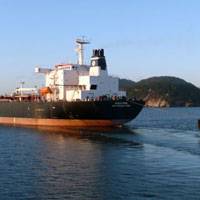Saudi-Iran Standoff and Oil Tankers
The Saudi-Iran standoff is certainly one to worry over given its ramifications for oil supply as they sit on either side of the Persian Gulf, the world’s biggest concentration of oil tankers, reports Bloomberg. The Strait of Hormuz at the mouth of the Persian Gulf is the world’s most important choke point for oil shipments, with about 17 million barrels of crude passing through daily. World chokepoints for maritime transit of oil are a critical part of global energy security. About 63% of the world's oil production moves on maritime routes. The Strait of Hormuz and the Strait of Malacca are the world's most important strategic chokepoints by volume of oil transit.
Union Pacific Line Back in Service after Derailment
U.S. railroad company Union Pacific Corp said on Monday that a rail line on which a train derailed in northern Colorado was back in service. The line, which is used about once a day, connects Windsor, which is in the Niobrara shale play in northeastern Colorado, as well as other towns in the state. The train, which was heading from Windsor to an East Coast destination, spilled 5,300 gallons of oil on Friday morning. Over the past several months, the industry has been under heightened government scrutiny due to an increase in train derailments involving oil tank cars. The amount of oil moving by rail from shale formations has risen sharply because the region is not well-connected to pipelines.
Final Contract to Fund Neah Bay Response Tug

The Washington Department of Ecology (Ecology) has extended its contract agreement with Crowley Maritime Corp. to station a state-funded emergency response tug at Neah Bay for another full year of service beginning July 1, 2009, through June 30, 2010. Under the $3.6m extension agreement, an emergency response tug will remain at Neah Bay to prevent disabled ships and barges from drifting onto rocks and causing oil spills in the Strait of Juan de Fuca and Washington's outer coast. The contract marks the final year the state will pay for the emergency response tug service. On March 24, 2009, Gov.
Russia Relying on Offshore for Future Production
Sakhalin Island currently is the oil and gas growth engine for Russia, which will rely on offshore regions for new production after 2010, the Oil & Gas Journal reported. By 2020, offshore fields could account for 20% of Russia's total oil and gas output. However, Russia must implement regulations and taxes before its offshore oil and gas assets can be developed since offshore royalty issues remain largely unaddressed. The Russian Duma is working on the Mineral Extraction Law and on a new subsoil law. The Russian government's anticipated shift to holding auctions for oil and gas blocks instead of tenders now appears unlikely. International oil and gas companies operating in Russia probably will be prevented from taking more than 49% interest in offshore fields.






